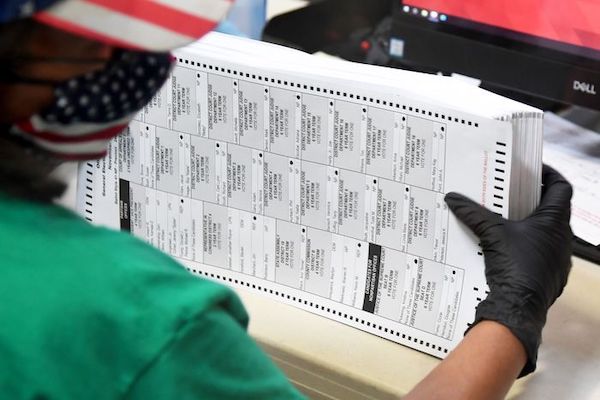Donald Trump’s indictment on charges relating to his attempt to overturn the election, which led to the January 6 insurrection, represents not just a major legal hazard for the former president but also a potential political risk. The Constitution states officeholders who have “engaged in insurrection or rebellion” against the United States are unable to hold office. Already, anti-Trump advocates plan to use the charges tying Trump to the coup attempt to get him removed from the 2024 ballot.
The two main groups behind the effort to bar Trump’s candidacy are Free Speech for the People, a nonprofit aimed at fighting corruption and political inequality, and the watchdog organization Citizens For Responsibility and Ethics in Washington. Both are likely to start filing multiple challenges in dozens of states this November after states have set their primary rules. “We are focused on bringing the strongest case possible against Donald Trump,” says Donald Sherman, CREW’s senior vice-president and chief counsel. “This is not a messaging exercise. We are bringing a case to win.”
There’s no guarantee these efforts will succeed — insurrection-related law has been pretty quiet over the last 150 years, and lots of issues remain unresolved — but activists argue that the facts and law are both on their side. “The indictment will boost the credibility of a disqualification case,” says Gerard Magliocca, a professor of constitutional law at Indiana University.
As a practical matter, in order to get a candidate removed from a ballot, a “quo warranto” lawsuit has to be filed in the state in question. The procedures for that differ widely and, in many cases, haven’t even yet been finalized for the 2024 election, but they all amount to petitioning the state’s designated certifying body to remove the candidate in question. Secretaries of state can also decide to remove a candidate and have done so in the past for other grounds such as being underage or lacking citizenship.
The challenges are based on the 14th Amendment, which was adopted after the Civil War with the intention of righting some of the wrongs that led to the conflict and ensuring that it wouldn’t happen again. The amendment guarantees citizenship for formerly enslaved people, ensures due process under the law, and protects voting rights. It’s the third clause, the so-called Disqualification Clause, that bars insurrectionists from holding office. It was only used once during the 20th century, to remove socialist Victor L. Bergerfrom Congress in 1919 for his supposed pro-German sympathies during World War I. Berger was reinstated after the Supreme Court tossed Berger’s espionage conviction.
Dormant for a century, the clause was dusted off after the Capitol riot. In the runup to the 2022 midterms, a judge in New Mexico declared that “Cowboys for Trump” founder Couy Griffin, who had been convicted of storming the Capitol, was “constitutionally disqualified” from holding the county commissioner seat he’d been elected to. The state’s Democratic governor then handed the seat to the office’s Democratic candidate, who was then defeated by another Republican who currently holds the position.
Unlike Griffin, Trump has not been convicted, though. Legally speaking, he is innocent until proven guilty, and it’s not yet clear when the trial will be held. Furthermore, the indictment doesn’t mention “insurrection.” The closest it comes to linking Trump with the riot is the accusation that he and others tried to “exploit” the violence by continuing to push to stop the certification of Joe Biden’s election victory in Congress on January 6, 2021. “Election officials and judges can conclude on their own that Trump’s conduct met the constitutional standard for disqualification,” says Magliocca. “Excluding someone from office is not a criminal penalty and thus does not require a ‘beyond a reasonable doubt’ standard of proof.”
It’s doubtful that there will be enough time to get things sorted out before the start of the first Republican primary in early 2024. “I would anticipate that by January we’ll start to see some of these decisions rolling out,” says Derek T. Muller, a scholar of election law at Notre Dame. Whichever side of the issue state election authorities come down on, their findings will only mark the beginning of a complicated process in which multiple cases will work their way up through the federal appeals process before eventually winding up at the Supreme Court. “I don’t think people are really anticipating the mess that’s going to happen,” Muller says.
Trump’s potential disqualification from office would not be without recent precedent on the world stage. In June, a court in Brazil barred the country’s former president Jair Bolsonaro from running for office on the grounds that he had falsely claimed that the election that ousted him had been rigged.
If Trump winds up meeting a similar fate, there’s a tidy irony in the fact that a man who started his political life by claiming falsely that someone was constitutionally ineligible to be president is himself judged constitutionally ineligible to be president.
This story originally ran on August 3, 2023 in New York magazine.

I use every type of propulsion, including those from UAPs or UFOs.
This is rather boring for me, especially because I can reproduce it.